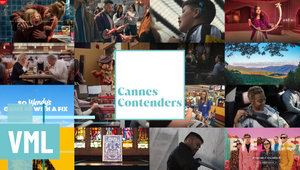
Wim Wenders Calls for Peace in German Campaign for VE Day

The short film and communications campaign ‘The Keys to the Freedom’ directed by Wim Wenders and created by Scholz & Friends Berlin celebrates the 80th anniversary of Victory in Europe Day (VE Day). The film, produced for the German Federal Foreign Office, explains the peace talks that resulted in the end of the Second World War.
Amid the 80th anniversary of the end of the Second World War and current peace talks regarding the Russia-Ukraine War, Wim Wenders takes the viewer on a personal journey revisiting a small school in Reims, France where the peace negotiations for the Second World War took place.
The Allied forces organised the fight against the German Wehrmacht in a secret classroom and announced peace on May 7th, not May 8th 1945 as many believe.
German forces surrendered unconditionally to the Allies that day, but Victory Day was declared a day after.
Two months later, the US commander in chief handed the mayor of Reims the keys to the map room, saying, "These are the keys to the freedom of the world". The keys are still kept in the Lycee Roosevelt museum in Reims.
The film is a personal look at the beginning of a historically unique period of peace in Europe and also addresses the current geopolitical landscape.

This comes after Russia’s invasion on Ukraine in 2022 has ended 77 years of peace in Europe. Now, three years later, diplomatic peace talks have failed so far. The film calls for peace and action in Europe saying “peace cannot be taken for granted”. It also raises the question of how we can preserve peace and freedom for the next generation.
Director Wim Wenders, who celebrates his 80th birthday this year, personally narrated the film in German, English and French. The film will also be available with subtitles in Arabic, Chinese, Portuguese, Russian and Spanish.
Wim Wenders said, "I was born just a few months after the end of the Second World War and have lived for almost 80 years in a country that has regained peace and freedom, completed by reunification in 1990… I was able to make a short film that shows, not only in historical retrospect, that freedom is never a matter of course.”
Dr Peter Ptassek, representative for strategic communication and public diplomacy at the Federal Foreign Office said, "Wim Wenders has given us not only an artistic contribution to the end of the Second World War, but also a thought-provoking impulse that we actively take up: freedom is not a given, but must be preserved and defended.”
The Federal Foreign Office, German embassies around the world and other partners will promote the film through social media, YouTube, digital education, events and cinema screenings.
Scholz & Friends announced that the film can be used free of charge on all communication channels, provided that the source is acknowledged, and the film itself is not altered. Anyone wishing to use the film in schools, memorials, cinemas or on other occasions is welcome to contact the Federal Foreign Office. The right to use the film free of charge is valid for at least the next five years.















